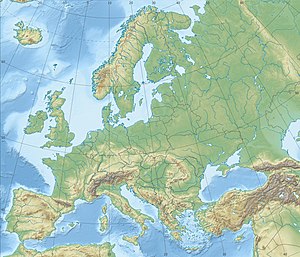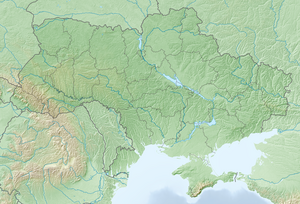Siege of Kinburn (1771)
| Siege of Kinburn (1771) | |||||||
|---|---|---|---|---|---|---|---|
| Part of the Russo-Turkish War (1768–1774) | |||||||
| |||||||
| Belligerents | |||||||
| | | ||||||
| Commanders and leaders | |||||||
| | | ||||||
| Strength | |||||||
| Unknown | Unknown | ||||||
| Casualties and losses | |||||||
| Unknown | Unknown | ||||||
Location within Europe | |||||||
The siege of Kinburn[a] was a military siege undertaken by Russia in August 1771 against the city of Kılburun, which was under Ottoman rule. The siege was part of the Russo-Turkish War (1768–1774), and resulted in an Ottoman victory.[1]
Siege
[edit]After having occupied much of the Crimean Khanate, the Russians matched onto the Ottoman fortresses of Özi and Kılburun (Kinburn). Following the failed siege of Özi, the Russians then turned their eyes to the fortress of Kinburn, which was very close to Özi. A force under the command of Vasily Dolgorukov laid siege to the fortress in August 1771. The defender of Kinburn, Abdullah Pasha, successfully repelled the invading Russian forces by 31 August 1771.[1][2]
Aftermath
[edit]Grand Vizier Silahdar Cihangirli Mehmed Pasha, who was in Varna at the time, awarded 10,000 ducats to Hazinedar Şahin Ali Pasha for his role in defending Özi, and gave 350 bags of aspers for the reinforcement of the fortress. He also awarded Abdullah Pasha with 3,000 ducats for standing his ground at Kılburun.[1]
Notes
[edit]Citations
[edit]- ^ a b c d von Hammer-Purgstall, Joseph. Çevik, Mümin (ed.). Büyük Osmanlı Tarihi [Great Ottoman History] (in Turkish). Vol. 16. Translated by Özdek, Refik. Istanbul: Üçdal Neşriyat. pp. 188–189.
- ^ Creasy, Edward S. (1856). The Ottoman Turks: From the Beginning of their Empire to the Present Time. Vol. 2. London: Richard Bentley. p. 235.


 French
French Deutsch
Deutsch
